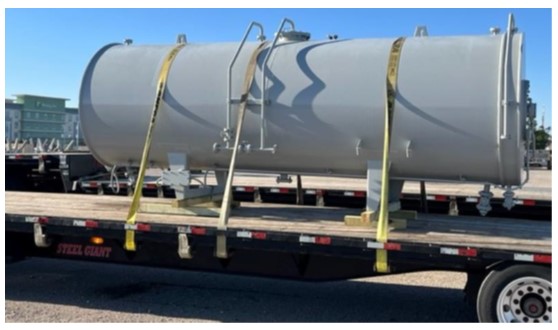Failure of slings during loading operations
What happened
Personnel were loading out heavy plant at a land-based location when there was an incident involving failure of slings. A crew were lifting a large tank with a forklift using nylon slings and shackles from the lifting eyes at the top. The forklift carrying the tank to the trailer had to move over some rough ground and the tank was moving around and bouncing, so spotters were used on both sides. One sling failed and the tank dropped to the ground on that side. Then another sling failed, causing damage to both sides of the tank bottom, valves, and one leg was bent. There were no injuries.
Work was stopped to regroup and discuss.
What went right
- A toolbox talk took place which covered the hazards;
- Spotters were used and all personnel were in their correct and safe positions.
What went wrong
- The slings broke due to the sharp edges not being protected there would have been high dynamic loads as the load shifted while being manoeuvered over rough ground.

Recommendations
- Ensure sharp corners and edges are protected before using soft slings – it is possible in this case that the edge of a fork was the sharp edge that cut the sling.
- A better practice would be to use a lifting attachment of some sort, or a crane – could the lift be done without soft slings?
Members may wish to refer to:
Safety Event
Published: 24 October 2022
Download: IMCA SF 23/22
IMCA Safety Flashes
Submit a Report
IMCA Safety Flashes summarise key safety matters and incidents, allowing lessons to be more easily learnt for the benefit of all. The effectiveness of the IMCA Safety Flash system depends on Members sharing information and so avoiding repeat incidents. Please consider adding [email protected] to your internal distribution list for safety alerts or manually submitting information on incidents you consider may be relevant. All information is anonymised or sanitised, as appropriate.
IMCA’s store terms and conditions (https://www.imca-int.com/legal-notices/terms/) apply to all downloads from IMCA’s website, including this document.
IMCA makes every effort to ensure the accuracy and reliability of the data contained in the documents it publishes, but IMCA shall not be liable for any guidance and/or recommendation and/or statement herein contained. The information contained in this document does not fulfil or replace any individual’s or Member's legal, regulatory or other duties or obligations in respect of their operations. Individuals and Members remain solely responsible for the safe, lawful and proper conduct of their operations.
